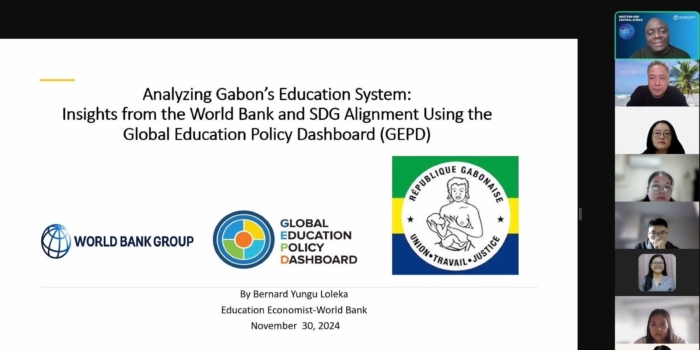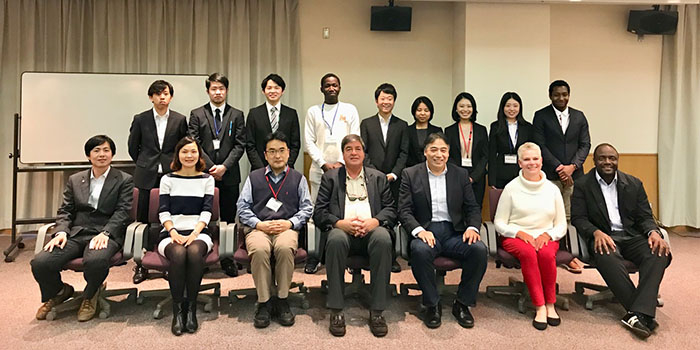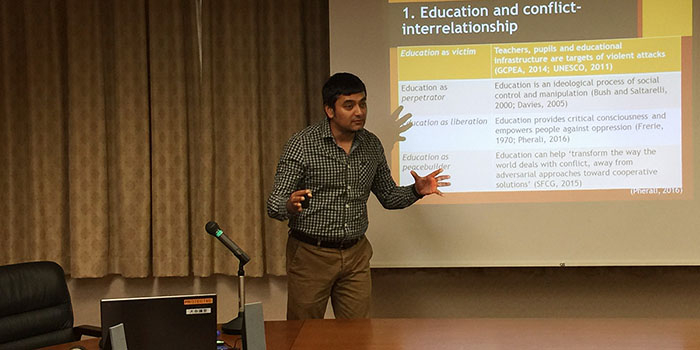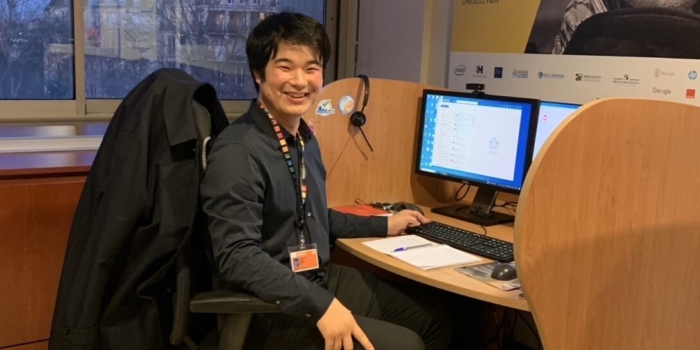On Saturday, November 30th, Dr. Bernard Yungu Loleka, an Education Economist at the World Bank, delivered an online special lecture titled “Analyzing Gabon’s Education System: Insights from the World Bank and SDG Alignment Using the Global Education Policy Dashboard (GEPD)”. Dr. Bernard obtained his master’s and doctoral degrees under the supervision of Professor Keiichi Ogawa at Kobe University’s Graduate School of International Studies. Dr. Bernard’s lecture focused on the World Bank’s approach to analyzing Gabon’s education system. He covered four key areas: (1) Overview of the Global Education Policy Dashboard (GEPD), (2) Methodology used by the World Bank to collect and analyze data in Gabon (3) Assessment and Evaluation Indicators, and (4) Cross-country comparisons.
Dr. Bernard began by explaining the objective of the study, which was to measure and identify the main drivers of learning in Gabon’s education system. He emphasized four critical aspects of education: (1) supplies and infrastructure, (2) school management, (3) students, and (4) teaching. A notable feature of his analysis was the categorization of areas needing improvement into three levels included need for improvement (0-80%), attention (80-90%) and in line (90%-100%).
To collect data, the World Bank surveyed 200 elementary schools across various regions in Gabon. Respondents included school principals, teachers, students, and civil servants. The results revealed that only about 10% of teachers demonstrated adequate content knowledge of the subjects they taught, and only 60% felt satisfied with their teaching skills. Other significant challenges included weaknesses in educational leadership and student learning preparation, all of which require substantial improvement. Dr. Bernard also highlighted the disparities between urban and rural schools. Urban schools generally had better teacher attendance, management practices, and access to supplies and infrastructure, while rural schools lagged. Despite Gabon’s status as a middle-income country, these gaps remain a significant obstacle to achieving equitable education outcomes. Another important point in the lecture was the comparison of learning outcomes between public and private schools. Dr. Bernard noted that there was huge gap of students’ learning achievement scores between public and private schools due to the lack of teachers with pedagogical skills and a lack of supplies and infrastructure.
Moreover, policy indicators from the study pointed to weaknesses in evaluation, monitoring, and accountability. The lack of standardization in school inputs was a critical issue, and political and bureaucratic capacity indicators highlighted the role of national policy in shaping education quality. National learning objectives and funding were not aligned to support effective learning assessments in the country. Dr. Bernard concluded his lecture by comparing Gabon’s education system to those of other African countries. While Gabon performs better than many, there is still room for improvement in key areas to achieve better education outcomes. His lecture provided valuable insights into how international organizations like the World Bank use tools like the GEPD to analyze and improve education systems globally.
The session ended with a Q&A, Dr. Bernard thoughtfully addressed each question and concluded by sharing his experiences, inspiring students to pursue careers in international organizations.
Finally, I would like to express my gratitude to Professor Keiichi Ogawa for organizing this invaluable seminar and to Dr. Bernard Yungu Loleka for his enlightening and inspiring lecture.
Authored by Leavsovath In (Master’s Student)
Related






